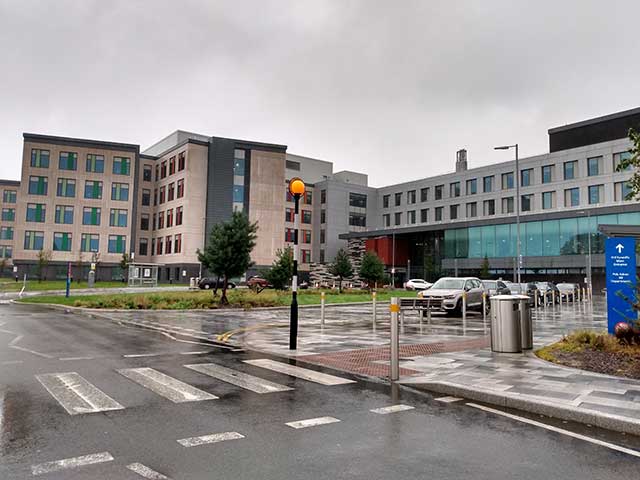DELAYS to ambulance handovers at the Grange Hospital appear to be reducing as a result of new ways of working.
The hospital, in Llanfrechfa, Cwmbran which has the only emergency department in Gwent with acute services centralised when it opened in 2020, has been one of the worst performing hospitals in Wales for getting patients out of ambulances and crews in position to respond to new 999 calls within the 15 minute target time.
Health bosses even installed giant fans at the hospitals doors in 2023 to disperse exhaust fumes from the numerous ambulances waiting to drop off patients, with some there for three hours or more.
The Aneurin Bevan University Health Board, which runs the hospital, has launched a drive to overhaul its practices named “Your Next Patient”.
At the board’s September meeting chief operating officer Leanne Watkins reported that is already having an impact on ambulance hand over delays since launching on September 8 and presented what she called “headline figures”.
170 hours lost
She said: “The week before we went live we lost 170 hours in ambulances delayed out on the forecourt.
“The first weekend running it we lost 20 hours. So in a week it’s been a miraculous, there’s no miracle it’s hard work and focus from the teams and we’ve been running twice daily huddles, at 8am and 5.30, for preparedness, and to trial and test different things”
Ms Watkins added: “We were among the worst in Wales around ambulance handovers. The Grange is one of the busiest sites in Wales for ambulance attendance and arrivals because of our model.”
There were 832 emergency department arrivals for the week ending on Sunday, September 21, with 85.8 per cent of them handed over within 45 minutes, said Ms Watkins.
“That was fourth out of 12 hospitals in Wales and when you look at the volume, and acuity of some of those crews in particular, that is outstanding.
“Before we went live with Your Next Patient we had an average lost hours per arrival of about two hours because we had some very long delays for those less acute patients and last week’s report shows it is just under 15 minutes which makes a huge difference in terms of our ability to respond to the community risk that we’ve been carrying as making sure that patients are in the most appropriate part of the system to receive their treatment as quickly as possible.”
Ms Watkins, who praised staff, said there was still “lots more work to do and opportunities to learn” and also acknowledged it is “early days” of the new system.
Improvements haven’t only been seen in ambulance delays as a result of the initiative and Ms Watkins said some hyper acute stroke patients have been seen within an hour and some fracture patients have had surgery in the afternoon having arrived at hospital in the morning.
She said the board also has work to do to make sure the new ways of working are sustainable.

